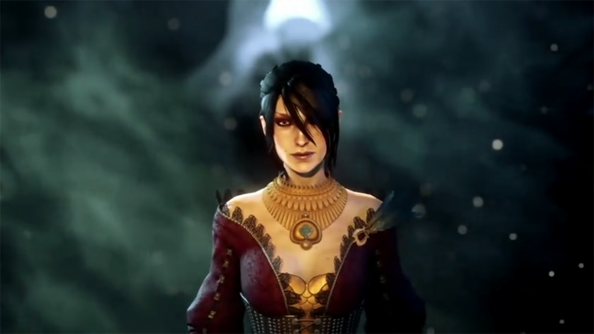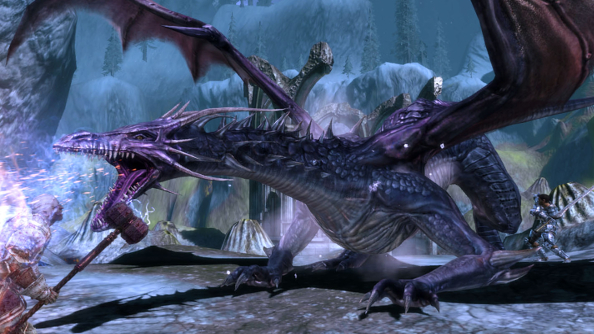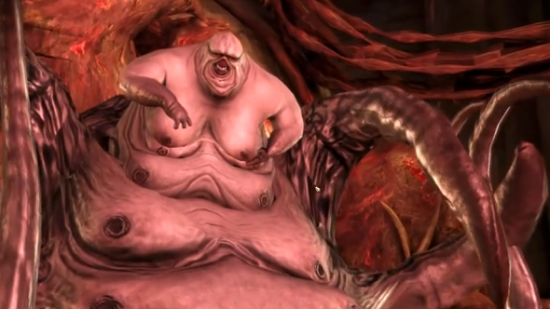There is a dwarf in one of the dungeons in Dragon Age: Origins who recites a disturbing poem as she sits hunched over, picking flesh from the floor. The sombre recital foreshadows a forthcoming fight with a hellish abomination known as the Broodmother. The Broodmother is more breast than beast – layers of sagging bosom roll over the top of one another like fleshy waves, a body made solely of red tentacles and pink blubber, the creature’s lips stretched back to reveal gingivitis gums.
Here is everything we know about Dragon Age 4.
The Broodmother you encounter was once a human woman. She was Held captive by a subterranean threat called the Darkspawn, who force-feed their victims Darkspawn tissue by vomiting it directly into their mouth. This process is carried out on a number of women, mutating them and giving them a taste for the flesh of their new Darkspawn brethren. Once fully transformed, these cannibalistic creatures can give birth to 50 Darkspawn at a time, with the ones they do not consume at birth enlisted into the Darkspawn army once strong enough. It is no wonder the Broodmother needs so many nipples.
Dragon Age: Origins is packed full of lore and detail like this: sickening, self-contained stories in a game where you are, ultimately, hunting a massive dragon known as the Archdemon, preparing to save the world in a climactic showdown.

One of the opening quests, The Arl of Redcliffe, tasks you with defending a cursed town from an undead army. You soon discover that Connor Guerrin, the pre-teen son of the Arl, has been possessed by a demon. There are multiple ways to deal with this problem: you can allow the child’s mother to sacrifice herself; you can enter The Fade, a dreamscape where demons reside, and confront the monster controlling him; or, you can euthanise the boy.
For reasons that should be entirely apparent, most games shy away from portraying the death of children, much less make you their murderer. In Dragon Age: Origins, however, the unsettling decision is thematically warranted. Like some twisted fairytale, children are the perfect prey for the game’s interdimensional oddities: naive, weak, and willing to believe that a talking cat is just that – a cat. Dragon Age: Origins imagines demons as not only evil beings, but as parasitic entities that latch onto the most vulnerable. Its outlook is bleak.
As with its desire demons that seduce their prey with promises of fame, power, and the pleasures of the flesh, Dragon Age: Origins constantly tempts you into giving in to your dark side. Hence there is another solution to The Arl of Redcliffe’s Connor problem: agree to a pact with Connor’s resident demon and it will grant you power. Let her keep control of the boy, let her lay dormant, and your character can win favour with your allies, or instantly learn blood magic with a simple dialogue option.

The structure of the game makes these temptations stronger still. Your ultimate goal is to stop the Darkspawn advancing from the bowels of the earth, and to slay the Archdemon – this is more important than any sub story. You are tasked with building up your power by any means and to recruit the strongest warriors to your army. Perhaps that means helping a powerful pack of werewolves to murder a village of elvish warriors, just because you would rather have the werewolves’ claws, fangs, and regenerative healing properties help out in the final battle, rather than the arrows of some wood elves.
With the next Dragon Age game recently confirmed to be in development, I would love to see the series return to the bleakness of the first game. Choice-heavy games are at their best when there is no simple answer to any solution, where you consider the big picture even as you help people with their personal problems. Sure, I’ll help you out, townsfolk, but what’s in it for me? What advantages will this give me in the final battle?
Dragon Age: Origins’ choices had more impact because of these considerations. It was a game that made you feel genuinely bad, and not just because you were roleplaying a character deemed morally corrupt. You feel bad because you made an awful decision, but you did it for good reasons. It is complex, messy, and dark. Wherever the next game takes us, I hope it embraces the series’ (literal) origins, takes all the components that made everything work so well, wraps them all in blubber, and pulls them into its gummy orifice with a slimy mess of tentacles.
